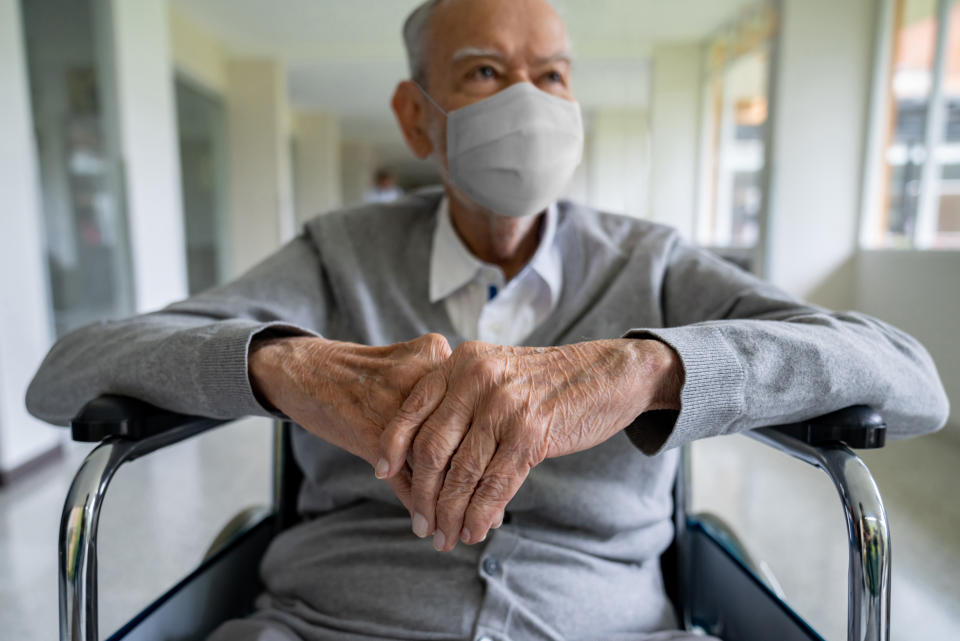Frailty ‘as big a risk for dying with coronavirus as age or poor health’
Scientists have stressed frailty should be considered as big a risk factor for dying with the coronavirus as old age or having an underlying health condition.
People aged 70 or over are considered “clinically vulnerable”, putting them at “moderate risk” of becoming seriously ill with the infection. Others in this group include pregnant women, the very obese and those with heart disease.
Those who are “clinically extremely vulnerable” and therefore at “high risk” include patients on chemotherapy and those who have had an organ transplant. Being frail is not mentioned on either list.
After looking at more than 1,500 coronavirus patients across 11 hospitals, scientists from Cardiff University found frailty more than doubled the risk of dying with the infection.
Early research suggests the coronavirus is mild in four out of five cases, however, it can trigger a respiratory disease called COVID-19.

‘Being frail affects your chance of recovery’
The National Institute for Health and Care Excellence (Nice) said in March – the start of the UK’s coronavirus outbreak – when adults are admitted to hospital, they should be assessed according to the Clinical Frailty Scale.
“We don’t know how much this is being used in practice”, said lead author Dr Jonathan Hewitt. “Our study shows it is vital to frontline care.
“Every COVID-19 patient should be assessed for frailty because we now know being frail, no matter how old you are or what underlying conditions you may have, affects your chance of recovery from this disease.
“Up until now the focus has been on age and other health issues but we believe this should now shift to frailty to make sure patients are receiving the appropriate, targeted treatment.”
Frailty has been defined as “diminished strength, endurance and reduced physiologic function that increases an individual’s vulnerability for developing increased dependency and/or death”.
To learn more about how it affects those with the coronavirus, the scientists looked at patients across 10 hospitals in the UK and one in Italy.
Of the more than 1,500 participants, two thirds were 65 or over.
Just under two thirds (65%) of those over 65 were considered frail, compared to one in five (20%) of the younger patients.
Results, published in The Lancet Public Health, revealed the patients who were considered “severely frail” were 2.4 times more likely to die with COVID-19 than those classed as “fit”.
This remained true after adjusting for age, other health issues and the severity of illness on admission to hospital.
“We need to think of frailty as being just as important as age or underlying health conditions when it comes to treating COVID-19 and we should now look at ways to help reduce frailty in the general population as a protective measure,” said co-author Dr Ben Carter from King’s College London.
“With the measures in shielding being relaxed in coming months and the ongoing possibility of a second wave of COVID-19 it will be important to have a meaningful indicator to help inform decisions as to who may have to shield again.”
From 6 July, people in England who are classed as being extremely clinically vulnerable will no longer need to stay 2m (6.5ft) apart from the people they live with.
People who live alone or are a single parent residing with their children will also be able to meet with one other household, “a support bubble”.
The extremely clinically vulnerable will be permitted to meet outside with people they do not live with in groups of up to six, providing they stay 2m apart.
The scientists stressed further research is required into whether geriatric care, physical activity and optimal nutrition could improve outcomes for frail patients.
“Greater awareness is needed around the concept of frailty and its use as a tool for assessment, both within hospitals and in the community,” said co-author Dr Kathryn McCarthy, from North Bristol NHS Trust.
“Frailty assessment is quick and easy. It could be routinely carried out by GPs or geriatricians in primary care, or even in care homes, allowing this information to be at hand on admission to hospital.
“Our findings may also adjust people’s understanding of their own personal risk from COVID-19.
“For example, younger people can be frail and higher risk but are told they are in a lower risk group, while older people who are not frail have been told they are at risk and need to shield just because of their age.
“If people believe they may fall into the high frailty category they should engage with their GP”.

What is the coronavirus?
The coronavirus is one of seven strains of a virus class that are known to infect humans.
Others cause everything from the common cold to severe acute respiratory syndrome (Sars), which killed 774 people during its 2002/3 outbreak.
Since the coronavirus outbreak was identified at the end of 2019, more than 10 million cases have been confirmed worldwide, according to Johns Hopkins University.
Of these cases, over 5 million are known to have recovered.
Globally, the death toll has exceeded 511,000.
The coronavirus mainly spreads face to face via infected droplets expelled in a cough or sneeze.
There is also evidence it is transmitted in faeces and survives on surfaces.
Symptoms typically include fever, cough and loss of taste or smell.
The infection itself has no “set” treatment, with most patients naturally fighting it off.
The steroid dexamethasone is being used in hospitals throughout the UK to reduce the risk of death among patients on ventilators or oxygen.
Officials urge people ward off infection by washing their hands regularly and maintaining social distancing.
Coronavirus: what happened today
Click here to sign up to the latest news, advice and information with our daily Catch-up newsletter
Read more about COVID-19
How to get a coronavirus test if you have symptoms
How easing of lockdown rules affects you
In pictures: How UK school classrooms could look in new normal
How public transport could look after lockdown
How our public spaces will change in the future
Help and advice
Read the full list of official FAQs here
10 tips from the NHS to help deal with anxiety
What to do if you think you have symptoms
How to get help if you've been furloughed



